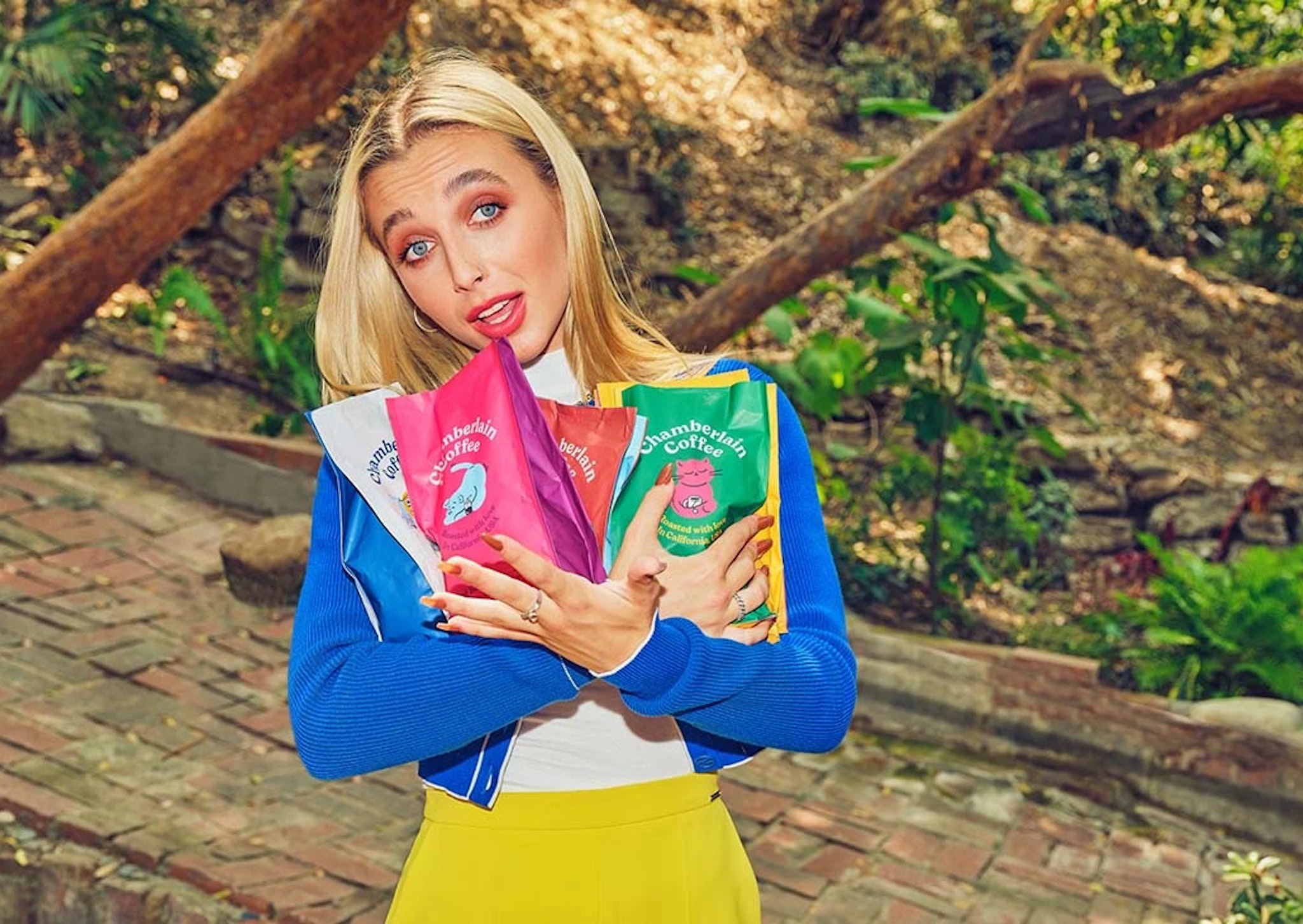Chamberlain Coffee has been on an absolute tear since launching in 2020. From consistently introducing new innovative coffee blends to engaging limited edition collaborations, the company has set the bar for what it means to be an energizing Gen-Z brand.
CEO, Chris Gallant has spent his career scaling beverage brands from Red Bull to the Bronx Brewery. We sat down with him to learn about what makes this business tick and why Chamberlain Coffee has been off to such an explosive start.
Bigger Than Celebrity. The success of a talent-led brand is not solely dependent on the celebrity involved. The biggest factors are a strong team and quality products. Consumer brand experts emphasize the importance of these elements over the celebrity’s involvement.
Team Alignment. In 2021 – one year after the official launch of Chamberlain Coffee, the founding team was on a mission to find a CEO that would build the business. The team would search for months to find the right leader who intimately understood the beverage category and had a track record of success.
Chris passed the criteria with flying colors.
However, being a member of the original founding team behind Chamberlain Coffee, Chris knew he had to do additional diligence to make sure the brand, Emma Chamberlain, and her team were aligned with his long-term goals for the brand. As he was being vetted to become the CEO, there were some conversations he knew he needed to have to ensure he was stepping into the right brand and role.
Chris shares, “I wanted to know if we were fully aligned at doing the same thing, thinking about the brand in the same way, and having the same respect for the quality of the product.”
They did.
The beverage category has a reputation for being extraordinarily challenging and unforgiving. Not to mention coffee is a heavily commoditized product which adds an additional hurdle to overcome. The best thing a brand can do is enter the category with a clearly aligned mission, value proposition, and belief as to why the product is needed in an already saturated market.
Knowing the founding team was fully aligned with a singular purpose and vision gave Chris the confidence to accept the CEO position. Now it was his turn to put together the right operators around the business.
While Chamberlain Coffee has seen tremendous success through its e-commerce channel, Chris is well aware that brick-and-mortar retail is the ultimate channel that the company will need to win. Building a team that can support a strong retail operation is key.
He explains, “We’re doing a lot with a very small team, but as we look to expand, one of our big goals for the next 24 months is to be much bigger in retail, because ultimately people still purchase the bulk of their coffee at retail – not on DTC. I just hired a new CMO, Liz Ahern. Our team’s priority is to make her team bigger and more focused on shopper marketing, category insights, and retail marketing.”
Notice that as Chris is explaining what it will take to be successful, he is focused on a singular idea: his team.
As a long-time industry veteran of the beverages category, he has seen the most highly capitalized businesses with access to top talent falter when it came to executing ideas. Alternatively, as one of the founding team members of The Bronx Brewery, he was part of the story of scaling an incredible business with a very lean organization. It all comes down to a singular question: can a team execute?
We can not even begin to talk about Emma Chamberlain’s involvement as a key determinant of success without laying the foundational idea that all talent-led organizations are only as powerful as the operating teams behind them.
Product Strategy. What makes coffee an especially difficult market to compete in can not be resolved by simply being backed by a celebrity. Chris and his team instead have to outline a more strategic approach to winning their market as the go-to beverage brand for Gen-Z.
- Product Quality
- Product Format
- Novelty
Product Quality. Most conversations around successful talent-led brands gloss over the importance of product quality – almost as though it is given. It is not. While product quality will rarely take a brand to the next level, it is the most important pillar on which a brand has to be built.
Chris explains, “I came from the world of craft beer. When I started in craft beer in 2010, there were 1500 breweries in the US. When I left, there were 10,000. Everyone’s making ten different IPAs and all of a sudden we have 100,000 IPAs out there in the US. You can’t say ‘my IPA is a higher quality than everyone else.’ It doesn’t cut. In a lot of ways, coffee is the same way.”
Notice how Chris frames his argument around product quality. Product quality is one of the most important determinants of long-term scalability. However, having a quality product and marketing it are two different ideas. Every brand needs a great product, but in a commoditized market like coffee, it will rarely be enough to drive sales.
Think about it. Chamberlain Coffee sources only the highest quality coffee beans. They’re all Arabica. They’re all organic. However, when is the last time you have seen the company speak to any of those points? This is by design. Most of their competitors are using similar beans for their coffee.
So if product quality is important to customer experience, but not a differentiating factor, how do you communicate the product experience another way?
Product Format. What Chris and his team identified early on is that product format was a huge buying point for their customers. Unlike most other generations, Gen-Z does not limit their coffee consumption to a single occasion. Instead, they are inventing new occasions throughout the day and week to consume coffee.
Chris explains, “Gen-Z wants single serves, more so than bags of coffee. 90% of our customers are drinking coffee not just as a morning occasion, but throughout the day, especially in cold format. Gen Z, more than anyone else, is consuming cold coffee more than hot.”
What’s interesting about this observation is that most Gen-Z consumers are just starting their relationship with coffee. Living a single, on-the-go lifestyle means they are not brewing coffee in pots for an entire family. This is a drastically different relationship with coffee than held by previous generations.
Chris sees product format innovation, not just as a satisfier of current Gen-Z demand, but as a long-term bet that the way coffee is consumed will evolve past purchasing bags of coffee beans.
Novelty. Perhaps the single most exciting feature of Chamberlain Coffee is the unique collaborations the brand has introduced in the past year – from a cereal collaboration with Off Limits to a limited edition pancake and syrup collaboration with Runamok.
We asked Chris why Chamberlain Coffee is betting so heavily on cross-brand collaborations.
He shared, “There are three reasons. One, we always want to give our fans an opportunity to interact with the brand in a unique and surprising way. Two, it allows us to expand our audiences. Three, it is almost always a good revenue driver.”
Sounds simple enough. However, Chamberlain Coffee has perfected the playbook on this in a way that few brands have even attempted. Executing a collaboration takes an extraordinary amount of planning and execution.
Here is the Chamberlain Coffee playbook at a high level. When brands are participating in cross-company collaborations, they need to ensure:
- The partnering company has a commitment to product quality and sourcing quality ingredients, so there is a mutual alignment on the ethos of the product offering.
- There is an alignment between branding and voice where two different customer groups feel a heightened sense of connection to the products when they are bundled together.
Emma. If so much emphasis on the success of a talent-led brand falls on the team and product, where does the celebrity/creator fit into the equation? Let’s be clear, Emma is a big part of the success of Chamberlain Coffee.
Chris shares, “We need to balance the trade-off of leveraging Emma’s reach to hit her growing audience [versus letting the product organically speak for itself.] We work with Emma to make sure [her audience] is aware of the brand, but not so much that it feels forced on consumers. It has to feel natural and organic.”
One of the biggest decisions any CEO of a talent-led brand has to make is how often they want to activate their celebrity partner. The decision is trickier than it may seem. However, in Emma Chamberlain’s case, she is very involved with the business, but Chris and his team still need to strategically find ways to activate her without overwhelming their consumer base.
Luckily, Emma even plays a massive role away from any consumer-facing angles.
Chris explains, “She’s involved a lot behind the scenes. I don’t think consumers see that overtly, but you see it in how our brand translates to consumers. Emma’s involved in things as small as helping us with Instagram captions to big things like our product roadmap. By having her heavily involved in all those points, the brand continues to feel authentic.”
This is what makes Chamberlain Coffee so special. Most brands think of leveraging their talent in one way – as a marketing tool. Emma is so dedicated to the business that Chris and his team have found multiple ways for her to participate.
This is special and few talent-led businesses have this type of talent partner.
Silver Lining. We predict Chris’ team is positioned to have a breakout year in 2023. With an ever-growing, loyal customer base Chamberlain Coffee is betting on the continuous momentum of the Gen-Z coffee drinker. With Emma on board, the company is entering the phase of its growth targeting retail expansion. You can find Chamberlain Coffee products at chamberlaincoffee.com.

